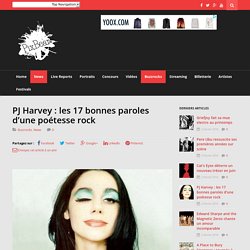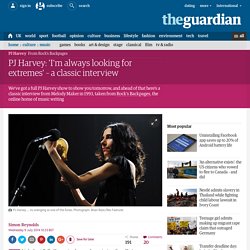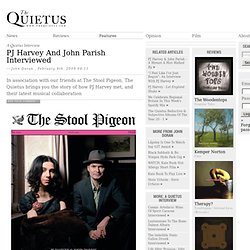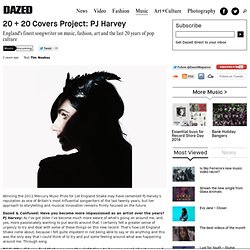

PJ Harvey : les 17 bonnes paroles d'une poétesse rock. PJ Harvey rime avec respectabilité.

Depuis son premier album Dry (1992), la songwriter britannique ne cesse de développer un univers alternatif où se mêlent rock, folk et poésie. Pour lui rendre hommage, Pixbear a rassemblé 17 citations de Polly Jean Harvey qui en disent long sur sa personnalité. 01. Si j’aime une personne « Je décide immédiatement si j’aime une personne et, si c’est le cas, je suis moi-même, et si ce n’est pas le cas, alors je ne donne rien » 02. . « Je ne déteste pas les interviews, je fais simplement partie de ces gens qui font de la musique parce qu’ils trouvent qu’il est difficile de parler » 03. . « Je ne crois qu’il faut être une âme torturée pour écrire de la bonne musique » 04. . « Je suis certainement beaucoup plus influencée par les réalisateurs et les peintres que je ne le suis par d’autres songwriters ou poètes » 05.
. « Les gens ont cette idée que je suis une sorte de monstre, et c’est l’extrême opposé de ce que je suis » 06. 07. 08. 09. 10. 11. 12. 13. 14. NME News Article Single Player - Chromeless. PJ Harvey: 'I'm always looking for extremes' – a classic interview. Think about Polly Harvey too long and you start reeling.

She's a mass, a mess of contradictions. Since she emerged out of nowhere (more precisely, her tiny hometown in rural Dorset) at the tail end of 1991, the 23-year-old singer has been the focal point of intense, fascinated scrutiny. No one can quite figure her out. When it comes to the gender map of 90s rock, she refuses to be tied down or placed. Listen to her band, PJ Harvey, and the immediate impression is that she's the most ferocious, feral she-rebel around, easily surpassing in both songcraft and primal abandon the "angry young woman" bands (Hole, Babes In Toyland, Bikini Kill et al) that are often regarded as her natural peers.
For hardcore Grrrl-ideologues, this makes Polly a sex-traitor, a collaborator with the boy-rock status quo. Harvey's desire to be one of the boys goes back to her childhood. She doesn't seem to know exactly what it is she prefers about men, so I offer a helpful hint. "It's the thrill of it. PJ Harvey Interview - Making of Uh Huh Her. PJ Harvey And John Parish Interviewed. PJ Harvey and John Parish are sat in a comfortable and welcoming pub in a small village near where the latter grew up and near the even smaller village where Polly was raised.

She lets out a victorious ‘Yes!’ When ‘Green Onions’ by Booker T and the MGs is piped into the little dining room we are sitting in next to an open fire. Outside of the window a tiny stream separates the road from a line of thatched cottages and the wind playfully aggravates the trees. Thin strips of blue are visible through scratches in the otherwise grey white expanse of sky. It must be the first nice day of the year so far. Why did you decide it was time to make another joint record? Polly: We’d talked about it and we knew we would for many years. So is this tactic of engineering various situations to avoid entropy something that you both rely on? John: I think that neither of us are interested in repeating ourselves. Polly: [whispering] Eighteenth. John: Her eighteenth birthday party! Polly: They aren’t, no. Stories From the Road - A Film About Following PJ Harvey. PJ Harvey's heartfelt laughter (compiling images for "Uh Huh Her")
PJ Harvey Interview - Making of Uh Huh Her. 20 + 20 Covers Project: PJ Harvey. Winning the 2011 Mercury Music Prize for Let England Shake may have cemented PJ Harvey’s reputation as one of Britain’s most influential songwriters of the last twenty years, but her approach to storytelling and musical innovation remains firmly focused on the future.

Dazed & Confused: Have you become more impassioned as an artist over the years? PJ Harvey: As I’ve got older I’ve become much more aware of what’s going on around me, and, yes, more passionately wanting to put words around that. I certainly felt a greater sense of urgency to try and deal with some of these things on this new record. That’s how Let England Shake come about, because I felt quite impotent in not being able to say or do anything and this was the only way that I could think of to try and put some feeling around what was happening around me. Through song. D&C: Why did you feel that now was the right time to become vocal about war and politics?
D&C: What was the change in you as an artist, as a lyricist?